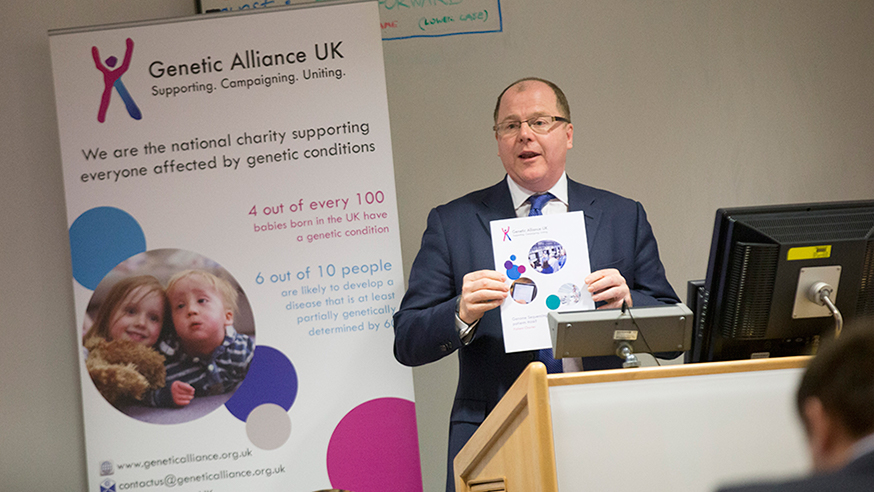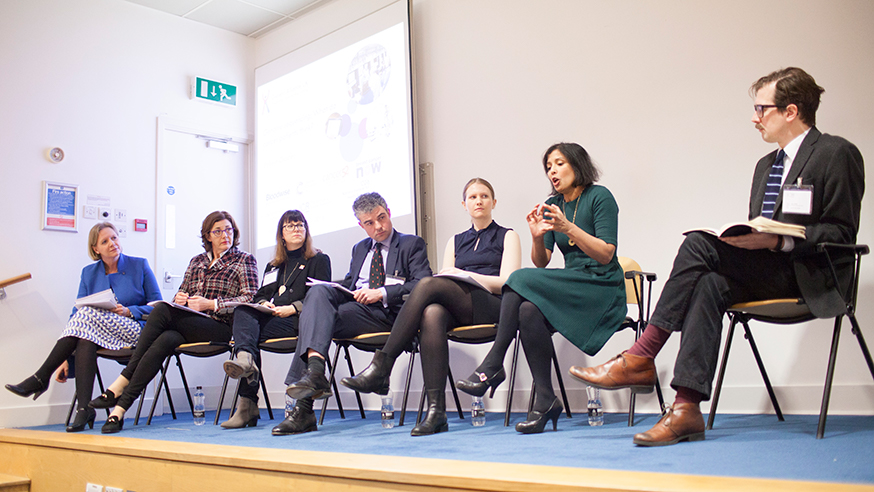
George Freeman MP, Minister for Life Sciences, launches a new Genetic Alliance UK report on patients' views of whole-genome sequencing (photo: Genetic Alliance UK / Josh Tucker Photography)
Whole-genome sequencing has the potential to revolutionise the way cancer is diagnosed and treated.
In recent years we have seen the speed and cost of sequencing fall to such a level that the 100,000 Genomes Project, led by Genomics England, is now aiming to sequence the genomes of cancer patients en masse.
So with a growing buzz around whole-genome sequencing, clinicians, policymakers, advocates and patients converged at a fascinating event earlier this month to discuss the implications for personalised cancer treatment.
Held at the Chester Beatty Laboratories of The Institute of Cancer Research, London on Tuesday 8 March 2016, the event was opened by the Minister for Life Sciences, George Freeman MP. He spoke passionately about his vision for an NHS where rapid genomic sequencing helps drive personalised treatment for every cancer patient.
The event was part of Genome Sequencing Week, and was organised in part to launch a new Genetic Alliance UK report [PDF] into cancer patients’ views on the future of whole-genome sequencing.
A panel discussion featuring Professor Nazneen Rahman, Head of Genetics at the ICR and The Royal Marsden, as well a number of other clinicians and advocates, raised some interesting points about the future of whole-genome sequencing.
The panel talked about what would need to be in place if whole-genome sequencing was to be embedded into routine care for cancer patients.

The ICR's Professor Nazneen Rahman debates the future of whole-genome sequencing with other members of the panel (photo: Genetic Alliance UK / Josh Tucker Photography)
Debate needed
We heard, for example, of the need to communicate effectively to patients and their families about the principles and potential implications of genomics – especially when asking patients to give informed consent on use and sharing of data.
What the future holds for whole-genome sequencing is unquestionably an interesting topic for debate. But the panel stressed that it shouldn’t overshadow equally important – and possibly more urgent – discussion over the current state of genetic testing for cancer patients in the UK.
Delegates heard that although genetic testing for cancer-causing mutations has been available for some time, uptake and commissioning of testing on the NHS has been patchy and inequitable.
Pilot programmes run at The Royal Marsden have explored new delivery models of gene testing in the clinic that could be a solution to the bottleneck. The ‘oncogenetic’ model, which broadens the number of approved cancer team members allowed to order genetic testing, has been found to be fast and effective – and successful at widening access to gene testing.
While the promise of genomics is exciting, there is still much research that needs to be done to fully understand the clinical relevance of whole-genomic data.
While that research is taking place it is important that we have two debates: one that looks to the future and one that addresses today’s concerns.
comments powered by